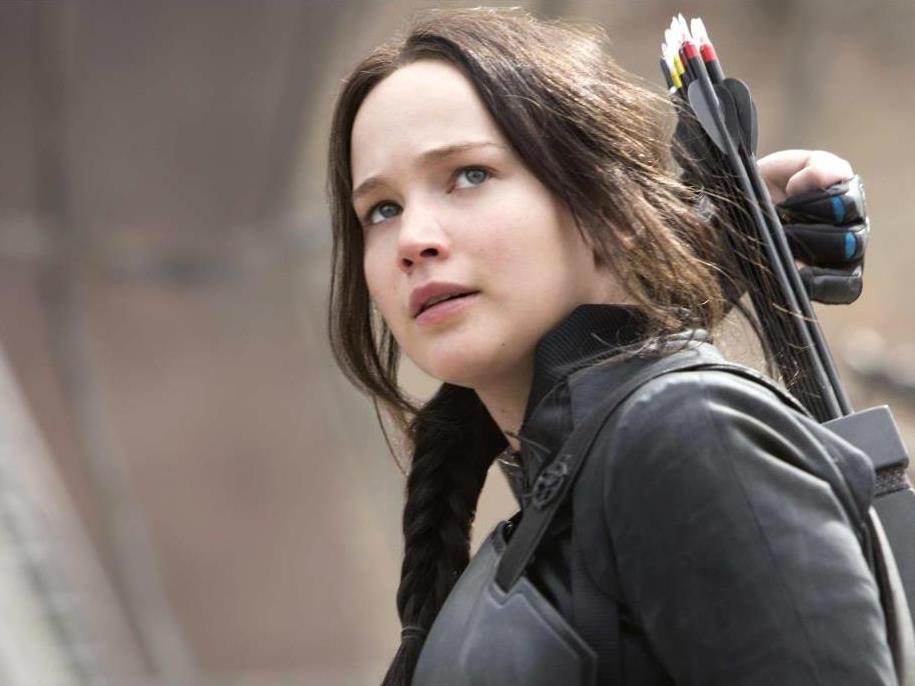Image: www.dendy.com.au
In the world of The Hunger Games — one of sacrifice and spectacle, brought from the page to the screen across four feature instalments, and stepping through the aftermath of casting humanity into a constant cycle of cruelty, control and combat — winning doesn’t guarantee a happy ending. The series’ protagonist, the reluctant Katniss Everdeen (Jennifer Lawrence, Serena), has learned this lesson many times. Whether she is emerging victorious at the titular contest, being championed as a heroine, using her popularity to agitate for change, or trying to fight on the trap-laden front lines, her glory is always shaded by grief for the price of her progress.
Indeed, after being plucked from the desolate District 12 to battle to the death for the amusement of Panem’s oppressors in the Capitol, hers has been a life of manipulation, punishment-fuelled hardship and conflict, with her tale to date leaving little doubt that the conclusion of her narrative arc will deliver more of the same. Accordingly, The Hunger Games: Mockingjay – Part 2 further underscores the sorrow and struggle that lingers in traumatic times, even for the triumphant. It’s a fitting statement to finish off a franchise dystopian in tone and war-obsessed in content, albeit one delivered in an unrelentingly grim and over-extended fashion.
Slipping straight back into the existing storyline with barely a moment’s pause, returning writers Peter Craig (The Town) and Danny Strong (The Butler) follow the next stage of Katniss’ exploits after Mockingjay – Part 1. As the finale of the preceding chapter made plain, her reunion with brainwashed fellow District 12 inhabitant and Hunger Games competitor Peeta Mellark (Josh Hutcherson, Escobar: Paradise Lost) is far from happy. With his ailing condition inciting her anger, she proceeds with her determined plan to assassinate Panem’s malicious President Snow (Donald Sutherland, The Calling).
Rebellion spearheads, including aspiring leadership alternative Alma Coin (Julianne Moore, Freeheld) and games maker turned strategist Plutarch Heavensbee (Philip Seymour Hoffman, A Most Wanted Man), ostensibly oversee her every move; however Katniss’ motives and actions are her own. Other soldiers, such as former neighbour and sporadic paramour Gale Hawthorne (Liam Hemsworth, The Dressmaker), share her journey as she navigates a minefield that bears more than a passing resemblance to the event that first immersed her into this situation, and attempts to finally eradicate a societal system that has brutally and blatantly subjugated the many for the benefit of the few.
Since its effective initial adaption of Suzanne Collins’s novels in 2012, The Hunger Games series has see-sawed in its subsequent book-to-cinema leaps: Catching Fire offered a rehash of its predecessor’s best elements, and Mockingjay – Part 1 thrillingly brought the kill-or-be-killed scenario out of the arena and onto the streets while contemplating the impact of propaganda, yet was lessened by its status as a movie spawned from half a book. Efficiently but non-distinctly helmed by three-time franchise director Francis Lawrence (Water for Elephants), Mockingjay – Part 2 apes the latter’s protracted, wavering fate. It pads out its running time with unnecessary and repetitive moments of solemn contemplation, ensuring the feature’s message lingers but remains elongated in its trajectory, as well as heavy-handed in hammering away to get its point across.
Once again, though, Lawrence — the filmmaker — has crafted a feature that reflects Katniss’ distressed mindset, with both the film and the character obsessing over the consequences of all that has come before. While such astute evocation of the protagonist in mood and aesthetics becomes the highlight of Mockingjay – Part 2, the parts used to achieve such a feat are often ill suited. Pondering the propagation of an existence persistently straddling the life-or-death chasm is poorly served by generic chases that feel ripped from earlier movies, even if they reiterate the monotony of war, and are interlaced with more striking set pieces. Similarly, shoehorning in beloved figures (Haymitch Abernathy, Effie Trinket and Caesar Flickerman, played by Out of the Furnace‘s Woody Harrelson, Magic Mike XXL‘s Elizabeth Banks and A Little Chaos‘ Stanley Tucci, respectively) becomes as cursory as the brightness — be it visual or comic — they offer in an effort otherwise pointedly but blandly shaded in bleakness and darkness.
Of course, the combined force that is Katniss and Lawrence — the actress — is the feature’s figurehead and weathervane, providing the place where all attention lands and the instrument that indicates where all sentiments are flowing. She’s Mockingjay – Part 2’s other standout, as tersely as ever channeling the difficulties of being caught in a world immersed in violence not just as entertainment and distraction but as a daily tactic of asserting authority, as well as the complexities of being aligned with a source of opposition more concerned about power rather than freedom. And while her character’s trauma comes to an aptly anti-climatic end, she plays the dour beats of this film as convincingly as she has the more valiant notes of the others. If the movie and the franchise have a winner, Lawrence is it, though supported by capable co-stars and achieving her success in an appropriately low-key manner. In a serviceable wrap up of The Hunger Games series, convincingly conveying the cost of the content she’s waded through can be the only true reward.
Rating: 2.5 stars out of 5
The Hunger Games: Mockingjay – Part 2
Director: Francis Lawrence
USA, 2015, 137 mins
Release date: November 19
Distributor: Roadshow
Rating: M
Actors:
Director:
Format:
Country:
Release:





